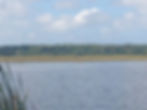
MANOOMIN
THE GOOD SEED,
THE GIFT OF THE CREATOR
Archaeological and Anishinaabe cultural evidence proves our relationship with Manoomin (wild rice).
The Manoomin garden is a means of travel and a source of diverse food.
This diversity includes my father's clan, Black Duck.
Wild rice has been around for a very long time.
We are part of the garden.
We are all part of the garden and it's time we get back into the garden.

OUR STORY
For the last 39 years Black Duck Wild Rice has been rehabilitating, protecting, and promoting wild rice.
Inspired by Harold Perry, whose grandmother carried seeds from Rice Lake to the Mississippi River near Ardock, James Whetung returned home from Ardock's 1982 food security uprising to his community of
Curve Lake First Nation determined to restore our wild rice beds with the
ultimate goal of putting the rice back in Rice Lake.
Anishinabek food sovereignty and food security had been eroded by colonial genocidal practices
and the health and wealth of the community was suffering.
James met with community elders to learn where their traditional rice beds had been
and received their direction to replant their traditional gathering grounds.
Pigeon Lake had been his grandfather's traditional gathering, hunting, and fishing grounds,
and he dedicated himself to restoring the then-destroyed ecosystem.
James and his clan (Black Duck) continue to work to restore their hereditary territory
and to put the rice back in Rice Lake!

EXPERIENTIAL WORKSHOPS
People of all backgrounds - Anishinaabe, Haudenosaunee, newcomers to Canada, those descended from settlers - join together at our Manoomin camp each Summer and Fall to learn together.
Participants hear about the history of Manoomin then participate in the gathering, roasting, dancing, and winnowing of the wild rice.
A limited number of workshops are available in 2021. Please contact us at blackduckwildrice@gmail.com for more information.






COMMUNITY-SCALE PROCESSING

In addition to traditional gathering and processing of Manoomin, Black Duck Wild Rice also gathers wild rice using an airboat and processes the wild rice into food using home-made machines.
Communities and individuals may contract our services for any or all of the stages of processing wild rice into food (gathering, curing, roasting, dancing, winnowing, packaging).
PROPAGATION & REHABILITATION SERVICES

